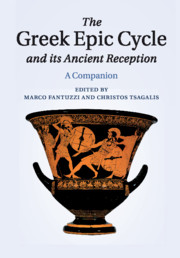Book contents
- Frontmatter
- Contents
- List of illustrations
- List of contributors
- Editorial note
- Introduction: Kyklos, the Epic Cycle and Cyclic poetry
- PART I APPROACHES TO THE EPIC CYCLE
- PART II EPICS
- PART III THE FORTUNE OF THE EPIC CYCLE IN THE ANCIENT WORLD
- 22 The aesthetics of sequentiality and its discontents
- 23 The Epic Cycle, Stesichorus, and Ibycus
- 24 Pindar's Cycle
- 25 Tragedy and the Epic Cycle
- 26 The Hellenistic reception of the Epic Cycle
- 27 Running rings round Troy: Recycling the ‘Epic Circle’ in Hellenistic and Roman art
- 28 Virgil and the Epic Cycle
- 29 Ovid and the Epic Cycle
- 30 Statius' Achilleid and the Cypria
- 31 The Epic Cycle and the ancient novel
- 32 The Epic Cycle and imperial Greek epic
- Works cited
- Index of principal passages
- Index nominum et rerum
28 - Virgil and the Epic Cycle
from PART III - THE FORTUNE OF THE EPIC CYCLE IN THE ANCIENT WORLD
Published online by Cambridge University Press: 05 August 2015
- Frontmatter
- Contents
- List of illustrations
- List of contributors
- Editorial note
- Introduction: Kyklos, the Epic Cycle and Cyclic poetry
- PART I APPROACHES TO THE EPIC CYCLE
- PART II EPICS
- PART III THE FORTUNE OF THE EPIC CYCLE IN THE ANCIENT WORLD
- 22 The aesthetics of sequentiality and its discontents
- 23 The Epic Cycle, Stesichorus, and Ibycus
- 24 Pindar's Cycle
- 25 Tragedy and the Epic Cycle
- 26 The Hellenistic reception of the Epic Cycle
- 27 Running rings round Troy: Recycling the ‘Epic Circle’ in Hellenistic and Roman art
- 28 Virgil and the Epic Cycle
- 29 Ovid and the Epic Cycle
- 30 Statius' Achilleid and the Cypria
- 31 The Epic Cycle and the ancient novel
- 32 The Epic Cycle and imperial Greek epic
- Works cited
- Index of principal passages
- Index nominum et rerum
Summary
Anyone addressing Virgil's relation to the Epic Cycle is faced above all with questions: did Virgil and his public read the epics in the original and, if so, did they read them all or only some of them, and in what version? Or was the material known only through later texts and primarily from handbooks? Or did the poet know the epics, but paid them no attention? Virgil is renowned for his allusive technique, but is his engagement with Homer or Apollonius Rhodius enough to prove that he used the Cyclic epics in the same way? And if he did, in whatever way, refer to them, which readers or listeners were able and expected to respond, and how were the relevant passages marked out for them?
One can begin from different angles: if the focus is placed on the Aeneid, we can evaluate the Cyclic epics as sources (of both motifs and structure) and as subtexts; if the main interest is the epics themselves, we can ask if the Aeneid permits inferences about these lost texts. Both approaches will be pursued here, but the latter much more briefly because its validity depends on the results of the first approach. Given the lost and fragmentary character of the epics, it is clear that we should not expect definitive answers to our questions.
The background: the Epic Cycle among Virgil's contemporaries
It is generally assumed that Proclus did not know the epics at first hand, but views differ about testimonia in early imperial authors. It is argued that when Pausanias and Athenaeus claim that they ‘read’ something in a particular author, they should not be taken literally. However, there are no real grounds to challenge the statements of such well-read authors. The same holds for the – rare – remarks in scholia and commentaries on other authors. Admittedly this general conclusion sidesteps the question of the form the Epic Cycle took at this time and where it was available.
- Type
- Chapter
- Information
- The Greek Epic Cycle and its Ancient ReceptionA Companion, pp. 543 - 564Publisher: Cambridge University PressPrint publication year: 2015
- 14
- Cited by



